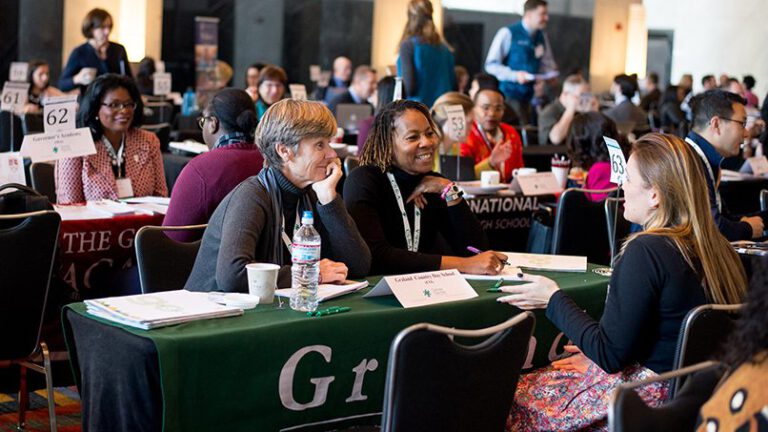7 Types of Schools You Might Meet at a Conference

Our annual hiring conferences bring together a variety of schools from across the country (and sometimes the world!) in one location. No two schools are alike, each with its own unique culture, mission, location, and community, rich in diversity, tradition, and innovation. Some are rooted in religious beliefs, some provide intensive academic experiences, some reflect a particular pedagogy, and some are specialized for specific populations.
Our conferences give candidates prime opportunities to advance their job search. While our national events feature a deeper pool of school types, both they and our regional events see a wide range of schools represented.
What kinds, exactly? Glad you asked!
Co-ed Urban Day School
Love life in the big city? A day school in a city like New York, Philadelphia, or Los Angeles might appeal to you. These schools are widely recognized for their rich curricular and advanced learning facilities. The small classroom style, individualized attention, highly-qualified staff, and the learning environment in these college-prep schools set their students’ journey into the best colleges. Schools in large metropolises might even have multiple campuses. Enrollment can range anywhere from under 200 to over 2,000 students.
Religious or Parochial School
Many of the schools we work with have a religious affiliation, such as (but not limited to) Catholic, Episcopalian, or Jewish. Schools in this category often have ties to or receive funding from a local church. Some such schools teach religious education, together with the usual academic subjects. Others use their denomination as more of a general label to describe on what the founders based the school’s mission. The curriculum at these schools often feature opportunities for communal or individual worship and strong community service programs. These institutions also place an emphasis on the school as a community – an educational community and a community of faith.
Language Immersion School
Parlez-vous Français? Then a bilingual or language immersion school might pique your interest. Language immersion schools immerse students in a second language, some of the most popular including French, Spanish, and Mandarin. In general, programs are designed for students whose native language is English, but foreign families living and working in the U.S. also send their children to these types of schools. Bilingual teachers teach classes in the second language to varying degrees, often depending on the age of the student. In some programs, the material taught in the foreign language is reinforced in English. These schools also emphasize cultural learning and appreciation.
Small Rural Boarding School
If you feel at home surrounded by trees or mountains rather than skyscrapers, then a rural school is for you. These schools are often found in more remote areas of the country, and can include a boarding option. Faculty and staff might live on campus (compensation packages might include free housing) serving as coaches, dorm parents, or advisors. Boarding schools pride themselves on offering a warm, family-like atmosphere; students don’t go home and leave campus at the end of the school day, but instead enjoy social community time in the dorms, extra-curricular activities with faculty members, weekend trips, and family-style meals.
Single-Gender School
Single-gender schools educate students of one sex. These types of schools can exist as one institution that only enrolls males or females, or as one school that features two different campuses, one for boys and one for girls. The reasons for and advantages of single-sex education are continuously researched and debated, but many believe this type of instruction benefits each gender because of their different learning needs. That aside, these schools provide their students with a unique educational experience and supportive community that prepares them for success in the future.
International School
International schools come in many different shapes and sizes and the term itself includes a variety of school systems encompassing a several formats and curricula. These schools generally follow a national or international curriculum different from that of the host country. Most will list an “American curriculum” among their offerings in addition to, in many cases, an International Baccalaureate (IB) curriculum. These schools mainly cater to students who are not nationals of the host country, such as children of expatriate families who live and work abroad. They therefore often have a multinational and multilingual student body, as well as a diverse faculty population. International schools are commonly found in Asia and Europe, although they exist in countries all over the world.
Philosophy-Based School
The goal of every school is to best prepare its students for successful lives as contributing and ethical citizens. The way each school goes about that goal, however, can be quite different. Schools that are built upon the foundations of an educational philosophy, such as Montessori or Waldorf, are rooted in philosophies about life and learning that are fundamentally different from mainstream education. Each is founded upon slightly, and sometimes drastically, different beliefs about what it means to live, learn, and grow in today’s society. For example, while both Montessori and Waldorf schools believe children need a connection to the environment, they are different in that Montessori focuses on real-life experiences and Waldorf emphasizes the child’s imagination and fantasy. These schools also differ in how they group students of different ages and how long each group remains with a single teacher throughout their educational journey.
While the list above gives a good general sense of the types of schools you could meet at our hiring conferences, it’s impossible to describe them all. By no means is this list exclusive! Each school is a unique community dedicated to educating children. You’ll find that while no two are exactly the same, they all share some common threads: outstanding academics, welcoming communities, and passionate faculty and staff.
Expanding your job search parameters to include a range of schools, especially ones you might be unfamiliar with, often leads to the discovery of some truly amazing communities. Talk with your Placement Team about your school preferences.
And don’t forget to register for our hiring conferences held each winter and spring across the country. Conferences are free to active CS&A candidates.
Not a candidate with CS&A? Apply today!








